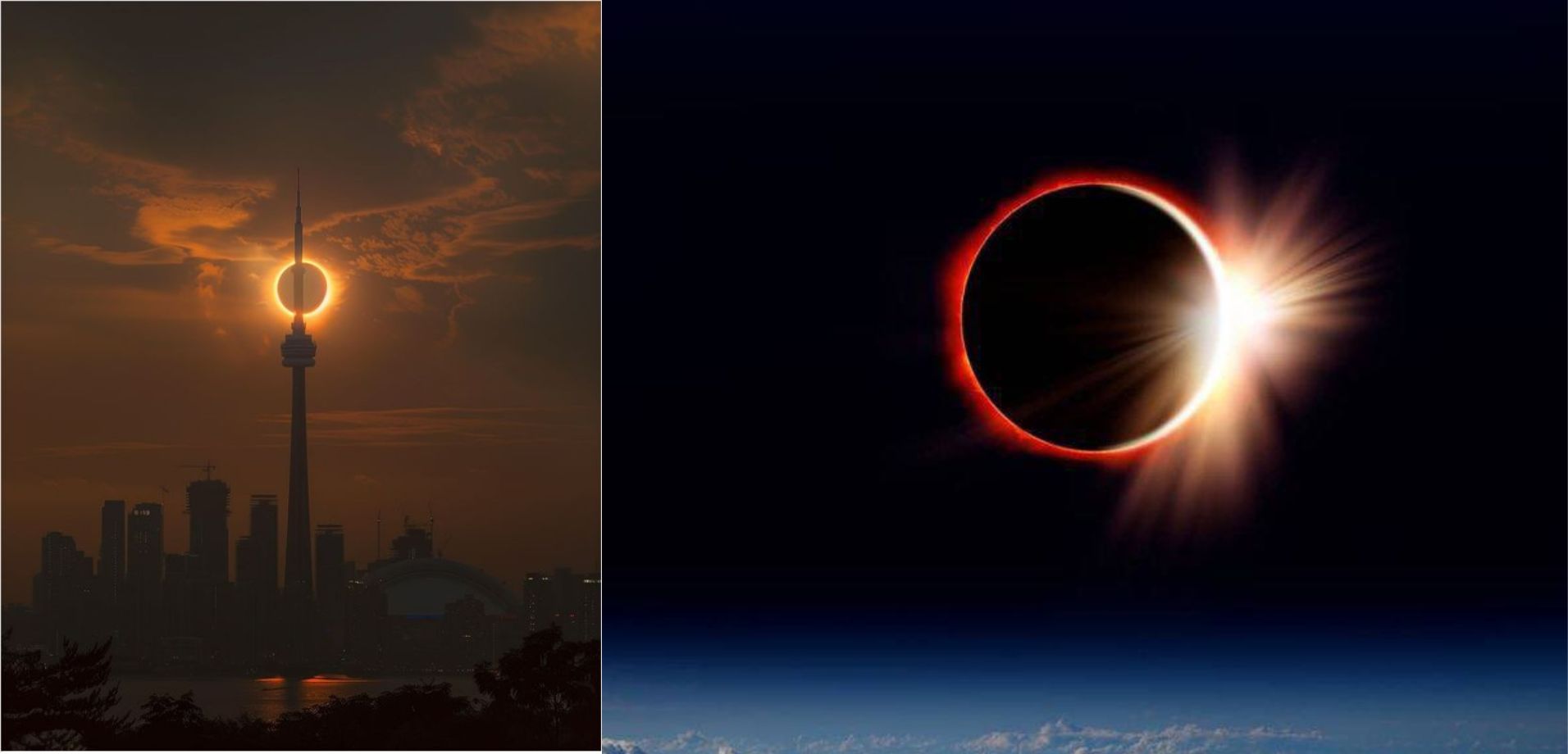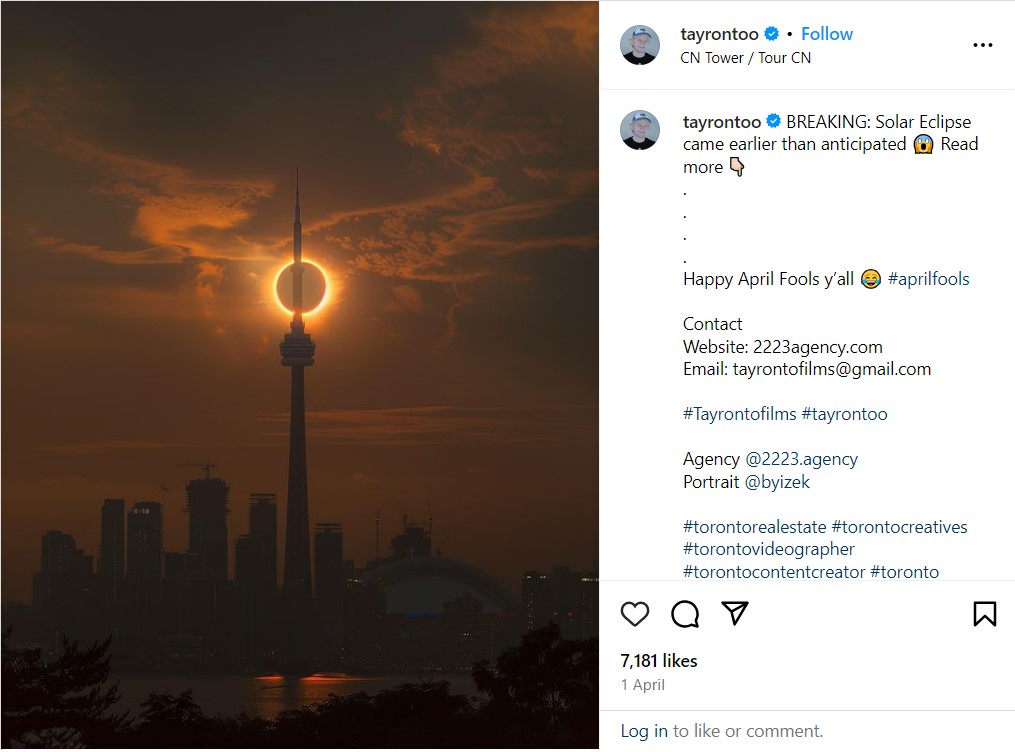Be Aware: Fake AI-Generated Photos Of Total Solar Eclipse Took Over Social Media
11th Apr 2024
Today’s reality is full of digital technologies based on artificial intelligence (AI). These technologies are developing so perfectly that they can imitate reality: you have seen the speeches of politicians, actors, or famous public figures generated with the help of neural networks. AI-generated photos seem to be everywhere.
So, it is not surprising that this wave of deepfakes also reached the astronomical news. The recent total solar eclipse, which those in North America observed on 8th April, has become the subject of a massive invasion of fake photos. But, resistance is futile, so we gathered the most impressive photos of the last solar eclipse, that turned out to be ordinary fakes.
Viral fake photo of solar eclipse behind the CN Tower in Toronto
Perhaps the most fascinating photo of the eclipse that Torontonians could watch was a photo featuring the solar eclipse behind the 553-meter CN Tower. The TV tower is the tallest structure in the entire Western Hemisphere of the Earth, so the published picture seemed like a very big stroke of luck for a photographer who just happened to catch a good moment.

However, further back-checking revealed that the photo was posted at 12:27 p.m. local time, while the total solar eclipse, covering 99% of the sun’s disk, only occurred in Toronto at 3:19 p.m. Further inspection of the original image indicated that it was first uploaded by the Instagram account tayrontoo (which already had posted AI-generated images) back on April 1st. The post under the photo claimed: “The solar eclipse appeared earlier than expected.”
Despite the fakeness of the image, which was later confirmed, the photo managed to be published by a number of resources, including the official Facebook page of the Canadian Embassy in Vietnam. But after users commented that the image was fake, the embassy deleted the image.
Fake ghosts of the past
Many news accounts on social networks were so eager to publish ‘breaking’ news that they didn’t even manage to create AI-generated images. Instead, they posted old videos and photos of eclipses, claiming they were fresh.
One of these “ghosts of the past” was the video of the total solar eclipse on the beach in Chile, shot on 2nd July 2019. However, the April eclipse has made this short clip viral again because the creators claim that it illustrates the latest astronomical event.
Another fake photo of the solar eclipse, apparently taken from aboard the International Space Station (ISS), showing a disproportionately large moon, immediately caused Internet users to doubt the authenticity of this photo. A Twitter user with the nickname Raj Prashikshit published a post that showed the reality behind them, whether they were AI-generated photos or not.
Dangerous fake glasses
This year’s eclipse spread fakes not only on the Internet. Before the event, the American Astronomical Society (AAS) urged people to buy only approved and safe solar viewing glasses.
In a post on its web page, the AAS warned people about the risks of using non-certified glasses. The message warned about purchasing fake brands from other manufacturers, bypassing all existing safety standards.

This year, unidentified Chinese factories put several models of “eclipse viewing glasses” under the names of well-known American brands on the US market.
Some solar glasses were marked by American Paper Optics (APO), one of the largest manufacturers of devices that protect against ultraviolet rays. Other forgeries were under the name of a verified Chinese supplier: Cangnan County Qiwei Craft Co. However, upon further inspection, it was found that the company had no connection to this fake batch.
The frames and logo of Qiwei’s leading North American distributor, Solar Eclipse International, Canada (SEIC), were illegally copied. The American Astronomical Society took the threat of using fake glasses very seriously because this could cost its users their vision.
Fake news from Elon Musk’s AI Grok
Some cases involving an AI response to the recent solar eclipse were amusing. For example, the Grok AI, part of Elon Musk’s paid subscription to X’s social network, published fake news about the “unusual behaviour of the Sun” based on humorous comments left by users of X.
When processing the content regarding the solar eclipse, Grok took users’ jokes very literally, resulting in a news story he wrote under the headline “Strange behaviour of the Sun: Experts are confused.” The article contained no specifics except for a fairly clear statement of the fact: “For reasons unknown to scientists, the Sun disappeared from the sky for a while.”
And therein lies the main concern regarding the development of AI: it still can’t think critically and has nothing to do with the working mechanism of the biological human brain. The neural network just knows how to manipulate information from the network successfully, and Grok’s lack of humour leads to nonsense when he tries to write news articles.
Finally, we want to repeat one simple truth: “Fakes are part of our everyday life.” You should use only proven astronomical news portals to avoid believing in beautifully generated fairy tales and falling for ai-generated photos. In our humble opinion, OrbitalToday is definitely one of that kind.
![Beauty of the Pink Moon And Lyrid Meteor Shower in This Week’s Best Astrophotos [19-26 April] Beauty of the Pink Moon And Lyrid Meteor Shower in This Week’s Best Astrophotos [19-26 April]](https://orbitaltoday.com/wp-content/uploads/2024/04/Pink-Moon-is-on-its-way-above-the-mountains-1-300x300.jpg)





Thank you for your comment! It will be visible on the site after moderation.